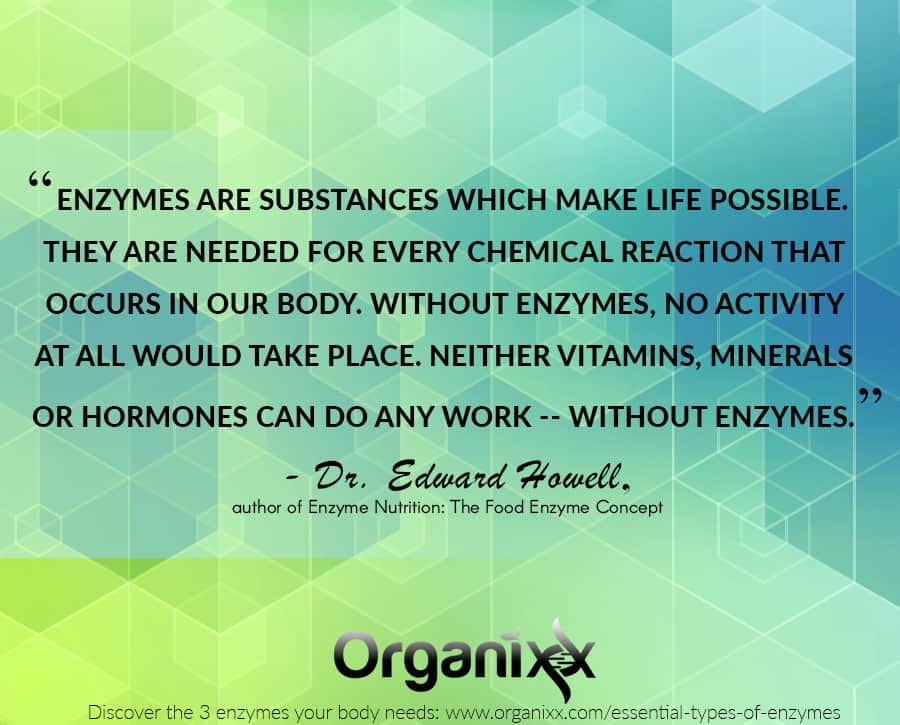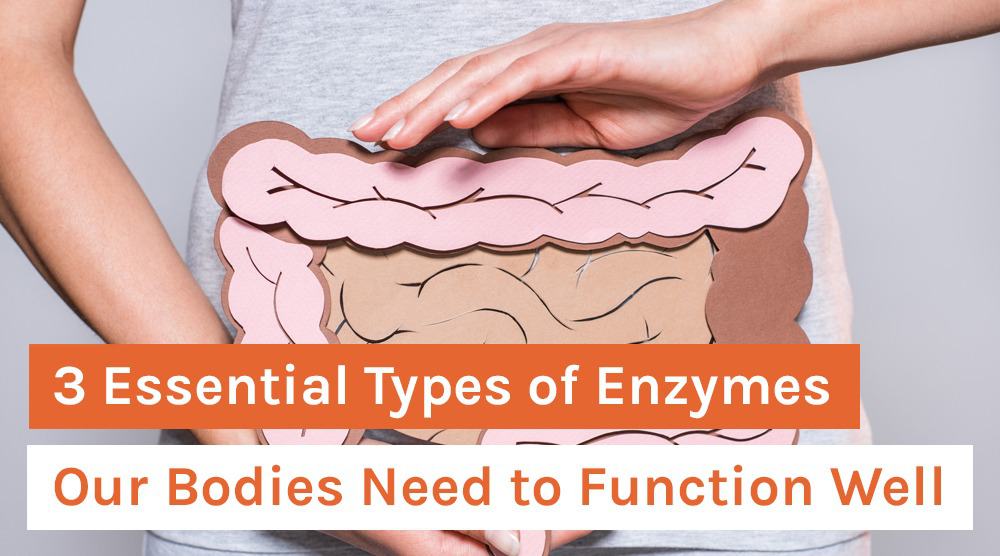3 Essential Types of Enzymes Our Bodies Need to Function Well
In a hurry? Click here to read the Article Summary...
Your body is equipped in many ways to handle the foods you put into it. But your body also relies on food itself to meet it halfway in furnishing certain conversion elements.
These elements pre-digest that food and extract its nutrients. They also deliver these nutrients to areas throughout the body where they’re needed. These conversion elements are known as enzymes, and they’re the foundation upon which human life exists.
The reason why these enzyme reserves are so important is that every biochemical process that takes place inside the body only occurs because of enzymes. Enzymes ensure that each piece of the vast molecular puzzle that makes up our bodies is functioning as it should, as well as interacting with all the other pieces in sustained congruence.
You can think of enzymes as a type of “micro miracle” that necessitates life as we see it animated in the human form.
The Good News/Bad News About Enzymes
 The good news is that the human body is designed to produce its own enzymes to aid in the food digestion process. It also has the ability to compensate for whatever enzymes are lacking in processed or otherwise enzyme-deficient foods – at least for a time. This is where the bad news comes into play…
The good news is that the human body is designed to produce its own enzymes to aid in the food digestion process. It also has the ability to compensate for whatever enzymes are lacking in processed or otherwise enzyme-deficient foods – at least for a time. This is where the bad news comes into play…
The fact of the matter is that the body is limited in the quantity and types of enzymes that it can produce for supplemental purposes beyond what it was originally designed to handle.
When the foods a person eats are persistently lacking in native enzymes, in other words, the body will eventually exhaust its own enzyme reserves.
What Happens When Food Lacks Essential Enzymes?
Enzymes are important for digestion – the primary way that our bodies obtain vital nutrients from the foods we eat. Enzymes are absolutely crucial if you want to live a long and healthy life, in fact, which is why you need to make sure that you’re getting enough of them.
Let’s take a closer look at the three primary types of enzymes that your body needs:
- Food enzymes – occur naturally in raw food. Their job is to begin pre-digesting food in the upper stomach; a process that takes between 30-45 minutes after eating.
- Digestive enzymes – are manufactured by the body to further break down this pre-digested food and deliver its nutrients through the gut wall and into the bloodstream.
- Metabolic enzymes – are also produced by the body, and perform various other important functions throughout the body such as cell tissue repair, waste cleanup, and even destruction of harmful cells.
Each class of enzyme is designed to perform its own unique set of functions to keep your body going strong. Together, this enzymatic trio is what sustains overall health and well-being – serving as the basis of life itself.

But what happens when one piece of this enzyme mosaic is thrown out of balance, such as when otherwise enzymatically-dense foods are cooked or processed?
Many people don’t know this, but enzymes are extremely delicate and volatile, despite their incredible importance and amazing abilities. When exposed to heat, even at extremely low temperatures of as little as 118 degrees Fahrenheit (48 degrees Celcius), enzymes in food quickly begin to die off in very high numbers.
Enzymes are also unable to withstand the types of processing that lands food in shelf-stable packages, boxes, and cartons. For many people, this is a very large percentage of what they eat on a daily basis.
Such heated and processed food, stripped of its  enzymes, is categorically speaking: dead. This means that the body has to offset the problem by producing extra enzymes to help digest this dead food before attempting to send its nutrient components into the small intestine for absorption.
enzymes, is categorically speaking: dead. This means that the body has to offset the problem by producing extra enzymes to help digest this dead food before attempting to send its nutrient components into the small intestine for absorption.
This is a difficult process that puts immense strain on vital organs like the pancreas that already have the responsibility of manufacturing enzymes for other purposes such as cellular tissue repair, toxin elimination, and waste removal.
While your body is equipped to adapt to problems like this in order to offset them, it can only do so for a limited time. The fact of the matter is that enzyme production potential and stores gradually diminish the longer the body has to overcompensate for enzyme deficiency in food.
This creates a situation where either food is no longer being fully and properly digested, or the rest of the body isn’t getting the enzymes it needs to repair tissue and clean up waste.
In some cases, both scenarios occur at the same, creating the ultimate recipe for a health disaster.
One of the most obvious symptoms of enzyme deficiency in your diet is poor digestion. If you often feel bloated or gassy after eating a meal, for instance, or experience abdominal discomfort on a regular basis, chances are you aren’t getting enough enzymes.
Organixx Enzyme 17 contains a whopping FIVE kinds of powerful protease enzymes in combination with one of the most advanced enzyme blends on the planet. It’s scientifically designed to help your body break down and process nutrients for better absorption, digestion, and overall health.

 Sources:
Sources:
Article Summary
The body is limited in the quantity and types of enzymes that it can produce for supplemental purposes.
Enzymes are important for digestion.
Food enzymes occur naturally in raw food. Their job is to begin pre-digesting food in the upper stomach; a process that takes between 30-45 minutes after eating.
Digestive enzymes are manufactured by the body to further break down this pre-digested food and deliver its nutrients through the gut wall and into the bloodstream.
Metabolic enzymes are also produced by the body and perform various other important functions throughout the body such as cell tissue repair, waste cleanup, and even destruction of harmful cells.



I do not have a colon & lack energy. I am Hungary a lot , but my wright is not compromised anymore. I feel like I don't get my energy out of my food
Gayle, I also don't have a colon (well I have a rectum and a little of the sigmoid, so no bag.) I am interested in this topic, how to get healthy.
I ordered Epigreens when I opened it it was only half full of the powder. Can you send me the other half of the powder I paid for.
Thanks, Tony
Me Too, please send other half of green powder!
I'm pretty sure those are by weight, not volume. The container is never completely full. You should have exactly 30 scoops in each one. (1 month supply)
It is consistently 27 scoops every time.
Hi Tony,
Please reach out to our customer support team for help with this: https://support.ox2022.organixx.com/submit_ticket
Why do pill and health companies supply oversized packaging. Who do they think they are fooling. A waste of energy, space and highly pollutive. We need to UNITE against this practice
Excellent post, thank you, the 3 types of enzymes are interesting. A good probiotic helps with the production of each type of enzyme as well correct?
No, you need to supplement with digestive enzymes.
Wow, this explains so much of what has been going on for years. When I started to clean up my processed diet to whole foods in July 2010 it made a huge difference. You just explained the "why" it is important and that your body can only handle so much dead food abuse. Thank you for this eye opening article! Allison C. Bayer, Plano, Texas USA
Yes I believe all that you say but I am in the UK and as my funds are limited it is very difficult for me to afford anything of this nature.
I would suggest you start doing two things that are healthy, easy and cheap.
1. Make kombucha drink, full of probiotics.
2. Make sprouts, loaded with nutrients. My favorites: broccoli, alfalfa, red clover, lentils, peas. But there are many more. Eat them raw with some vinegar, olive oil and white tahine.
Plenty of info on the web (incl. youtube) about the how to.
I live in U.K. too. Eat a good mixed salad daily and eat some raw food (organic if possible) before eating cooked food. I usually have a few sticks of celery and anything else to chomp on raw while preparing my cooked food.
Eat raw fruit, raw salad, and steamed crunchy vegetables/ stir fry vegetables (crunchy) and it will help greatly, and eat probiotic food, bananas, rolled oats, almonds, leeks :)